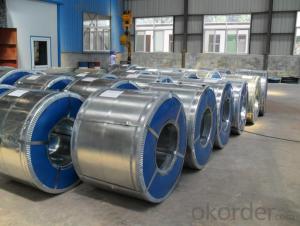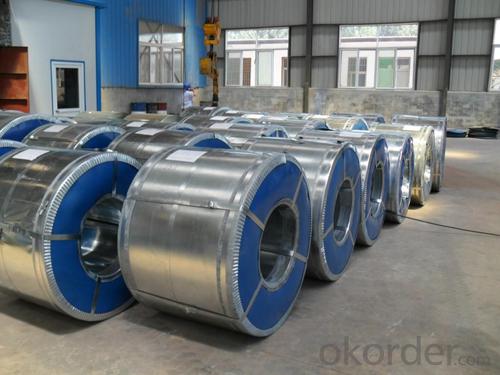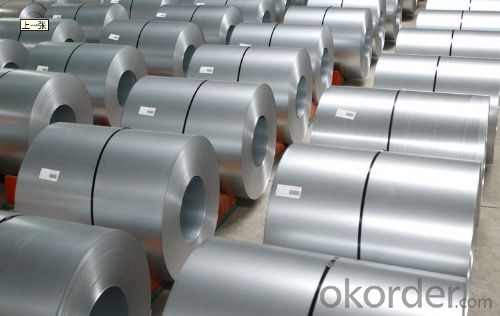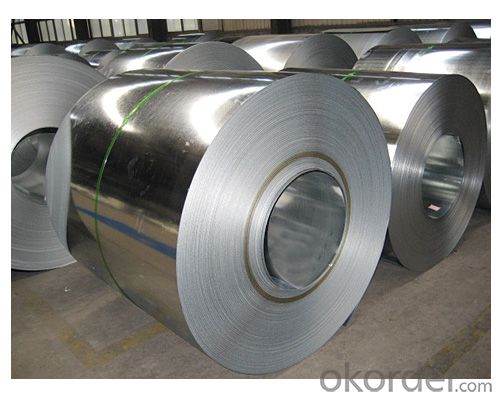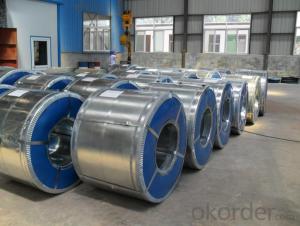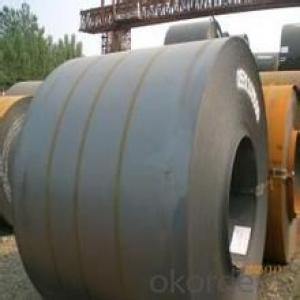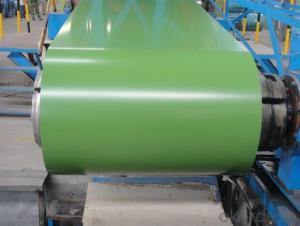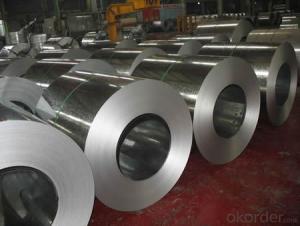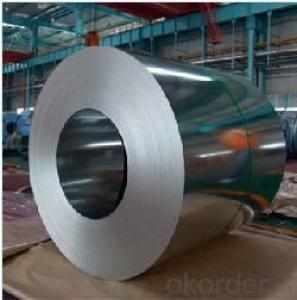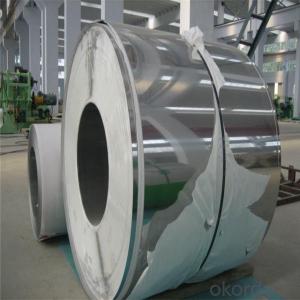Prime Hot-dip galvanized steel coil and sheet
- Loading Port:
- Shanghai
- Payment Terms:
- TT OR LC
- Min Order Qty:
- 60 m.t.
- Supply Capability:
- 8000 m.t./month
OKorder Service Pledge
OKorder Financial Service
You Might Also Like
Commodity | Hot dip galvanized steel coil and sheet |
Technical Standard: | JIS 3302 / ASTM A653 / EN10143 |
Grade | DX51D / DX52D/ DX53D/ S250,280,320GD |
Types: | Commercial / Drawing / Deep Drawing / Structural quality |
Width | 500/650/726/820/914/1000/1200/1219/1220/1250mm |
Thickness | 0.12-2.8mm |
Type of coating: | Galvanized |
Zinc coating | Z30-275g/m2 |
Surface Treatment | Chromed / Skin-pass/ Oiled/Slightly Oiled/ Dry/ Anti-fingerprint |
Surface structure: | Zero spangle / minimized spangle / regular spangle/ big spangle |
ID coil | 508mm or 610mm |
Coil weight | 3-8 MT per coil |
Package: | Properly packed for ocean freight exportation in 20''containers |
Application: | Industrial panels, roofing and siding for painting |
Price terms | FOB,CFR,CIF |
Payment terms | T/T or L/C |
Delivery time | Within 30 days |
Remarks | Insurance is all risks |
MTC will be handed on with shipping documents | |
We accept the third party certification test,such as SGS/BV |
Technical data :
Hot dipped galvanized coil Technical Data
Chemical Composition | ||||||
GRADE | C | Si | Mn | P | S | Ti |
SGCC/DX51D+Z | ≤0.10 | ≤0.50 | ≤0.60 | ≤0.10 | ≤0.030 | ≤0.020 |
DX52D+Z | ≤0.10 | ≤0.50 | ≤0.60 | ≤0.10 | ≤0.030 | ≤0.020 |
SGCD/DX53D+Z | ≤0.10 | ≤0.30 | ≤0.50 | ≤0.05 | ≤0.030 | ≤0.020 |
SGCE/DX54D+Z | ≤0.10 | ≤0.30 | ≤0.30 | ≤0.03 | ≤0.020 | ≤0.020 |
DX56D+Z | ≤0.10 | ≤0.30 | ≤0.30 | ≤0.03 | ≤0.020 | ≤0.020 |
Structural | ≤0.20 | ≤0.60 | ≤1.70 | ≤0.10 | ≤0.045 | |
Hot dipped galvanized steel coil Mechanical Properties | |||
GRADE | Yield Strength MPa | Tensile Strength MPa | Elongation % |
SGCC(DX51D+Z) | ≥205 | ≥270 | - |
SGCD(DX53D+Z) | - | ≥270 | 38 |
SGCE(DX54D+Z) | - | ≥270 | 40 |
DX56D+Z | - | ≥270 | 42 |
- Q: did bible stated that steel is coming from outer space. i mean meteor rocks that enter our earth sistem contains the minerals iron.
- If you are using either an NAB or RSV translation of the Bible, steel is only mentioned once in the Bible. Compare Nahum 2:4 (NAB) and Sirach 31:26 (RSV). There is no reference of an outer space in the Bible. Furnace is mentioned in Sirach. It takes a lot of energy to mix Iron and Carbon to produce steel. The alloy can only be produced in the furnace at an extremely high temperature.
- Q: i have a sword and some knives that have this grade steel. so is it a high grade or low grade? and how can i tell the differance between a high grade and a low grade?
- For throwing knives, 440 isn’t necessarily a bad choice. Does it list whether it is 440c or 440b? That matters somewhat. The advantages of 440 Stainless is that it’s relatively hard (for a stainless), it resists rust significantly, and it’s not so hard that it would shatter or break. On the down side 440 is notorious for not taking or holding an edge, but for a throwing knife, that’s probably not much of an issue. If you’re looking for something to train with, you’re fine here. It’s plenty of steel enough to stick in wood or other targets. Odds are it won't bend if you slam it into some wood. If it lands on concrete, eh, it's going to scratch and all that jazz, and it might hurt the tip if it hits first, but as has been said, you can use a file or grinder to get the tip back.
- Q: How do steel coils contribute to the renewable energy sector?
- Steel coils contribute to the renewable energy sector by playing a crucial role in the manufacturing of wind turbines and solar panels. These coils are used to produce the structural components of wind turbine towers and solar panel support structures. Additionally, steel coils are also utilized in the construction of transmission lines and grid infrastructure for renewable energy projects, ensuring efficient distribution of electricity generated from renewable sources.
- Q: What are the common challenges faced in steel coil production?
- Some common challenges faced in steel coil production include ensuring consistent quality and dimensional accuracy, managing the high energy consumption involved in the production process, handling and transporting heavy coils safely, and minimizing the risk of surface defects and damage during processing and storage. Additionally, maintaining efficient production speeds, optimizing material utilization, and meeting customer demands for timely delivery can also pose challenges in steel coil production.
- Q: How are steel coils shipped internationally?
- Steel coils are typically shipped internationally using cargo ships or freight trains. The coils are securely loaded onto flatbed or container vessels, ensuring they are properly secured to prevent any damage during transportation. This method allows for efficient and cost-effective transportation of large quantities of steel coils across the globe.
- Q: How are steel coils used in the manufacturing of industrial machinery?
- Steel coils are used in the manufacturing of industrial machinery as they serve as the primary raw material for various components such as frames, casings, gears, and structural supports. These coils are typically cut, shaped, and welded to create the desired machine parts, ensuring strength, durability, and precision in the final product.
- Q: Cast steel welding
- I Use these for cast iron, www.yms .uk/welding-rod-small-pack/2.5mm-cast-iron-welding-rod-small-pack/1951/11612/detail.asp they are expensive when compared to welding rods for steel but i find that normal steel ones dont work on cast iron
- Q: i want to know if i should buy a set of acrylic tapers or steel. they r close in cost so it's not a money factor i want to know which work better and if there is a downside to either. thanks!
- Steel is better. Acrylic is porous so isn't as suitable for piercing jewellery as steel. Steel can also slide through easier for some people, acrylic isn't quite as smooth. For tapers it doesn't make a huge deal of difference as they're only passing through your ear briefly, not being worn as jewellery, but if they're close in cost anyway then go for the steel. And the plugs you insert after putting the taper through should always be steel, titanium or glass until your stretch has healed.
- Q: What are the common uses of coated steel coils?
- Common uses of coated steel coils include roofing, siding, automotive parts, appliances, and building materials. The coating on the steel helps to protect it from corrosion and enhances its durability, making it suitable for various applications in industries such as construction, manufacturing, and transportation.
- Q: What are the different methods of coil slitting for steel coils?
- There are several different methods of coil slitting for steel coils, each of which serves a specific purpose and is used in different industries. Here are some of the common methods: 1. Rotary shear slitting: This is the most widely used method for coil slitting. It involves using a set of rotating knives to cut the steel coil into smaller strips. The rotary shear slitting method is known for its high speed and accuracy, making it ideal for large-scale production. 2. Loop slitting: In this method, the steel coil is fed through a loop control system that maintains a constant tension. The coil is then cut into strips using a rotating knife. Loop slitting is commonly used for thinner gauge materials and is known for its ability to produce clean, burr-free edges. 3. Oscillating shear slitting: This method involves using a set of oscillating knives to cut the steel coil. The knives move back and forth in a rapid motion, creating a shearing effect that cuts through the coil. Oscillating shear slitting is often used for thicker gauge materials and can handle higher tensile strengths. 4. Crush cut slitting: Crush cut slitting is a method where the steel coil is cut by pressing a circular blade against the coil. The blade crushes the material, creating a cut. This method is commonly used for softer materials or when edge quality is not critical. 5. Slit edge rolling: Slit edge rolling is a method that involves rolling the edges of the steel coil after it has been slit. This process smooths out the edges and improves the overall appearance of the strips. Slit edge rolling is often used for applications that require a high-quality finish. 6. Laser slitting: Laser slitting is a newer method that uses a laser beam to cut through the steel coil. This method is precise and can handle a wide range of thicknesses. Laser slitting is commonly used for high-precision applications where edge quality is critical. These are just a few of the different methods of coil slitting for steel coils. The choice of method depends on factors such as the thickness and tensile strength of the material, the required edge quality, and the intended application of the slitted strips.
Send your message to us
Prime Hot-dip galvanized steel coil and sheet
- Loading Port:
- Shanghai
- Payment Terms:
- TT OR LC
- Min Order Qty:
- 60 m.t.
- Supply Capability:
- 8000 m.t./month
OKorder Service Pledge
OKorder Financial Service
Similar products
Hot products
Hot Searches
Related keywords
